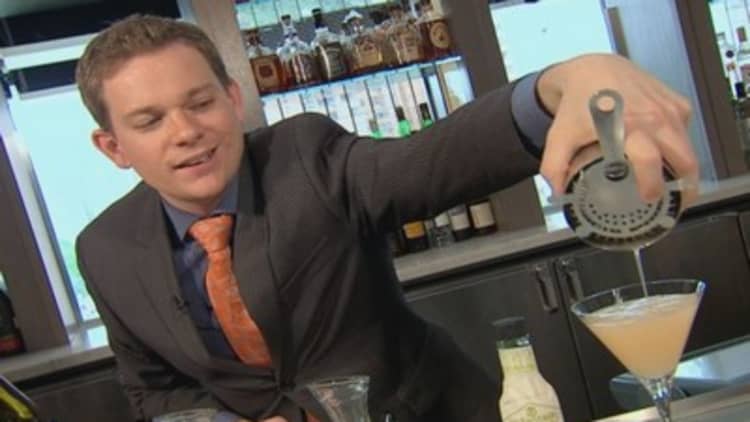For spirits makers, there's a variation of the old adage: To make a small fortune, start with a large one.
Taking up yoga might not hurt, either.
Like many entrepreneurs, people in the spirits industry face the challenge of pairing artistry with marketability. The idea has to be good, but it also has to be profitable—and often, that means turning to partners or investors.
"You get into this for the love and passion of what you're doing ... but it's about money ultimately, and power you don't have," Simon Ford, co-founder of The 86 Co., told attendees Wednesday at a panel on how to launch a spirits company.
Read More6 over-the-top cocktail splurges
It's crucial to have some skin in the game yourself, said Malte Barnekow, chief executive of The 86 Co., whose brands include Ford's Gin and Aylesbury Duck Vodka. "It doesn't matter if it's $100 or $100,000, so long as it hurts," he said.
Opt for the partnership route, and you'll need to be cautious about the number, and nature, of who signs on, said Raj Bhakta, founder and chief executive of WhistlePig Whiskey. "It's all the struggles of marriage with none of the sex," he said.

It's a mismatch if say, one partner just wants to make money and another is determined to save the world. (Ford said he maintains The 86 Co.—which has five partners—is saving the world, by giving real heroes a drink.)
At least one of the partners should be a numbers guy, said Barnekow, and there should be a clear leader—either overall, or for each key area of the business. That division helps the vision translate into something profitable.
It can also help tame egos. "When it comes to partnerships, you have to adopt a Zen Buddhist idea," he said.
Read MoreMistakes that are ruining your homemade cocktails
Spirits entrepreneurs who opt for the investor route should aim first for "the three Fs": friends, family and fools, said Barnekow. No one else will be crazy enough initially to give you money, he said, and it can help you stay focused on running the company rather than devoting most of your time and energy to courting investors. "If you can avoid raising money ... that's huge," he said.
Panelists also told attendees that an initial lack of funds shouldn't prevent them from taking action. Prepare an elevator pitch and a business plan, and start making your idea a reality. "Start a business plan, or just start a f------ business," said Bhakta.
CNBC.com will be in New Orleans for the 12th annual Tales of the Cocktail festival from July 16-20. Check back for our coverage throughout of the trends shaping what you'll drink at home and on the town—and how much you'll spend to do so.
—By CNBC's Kelli B. Grant


